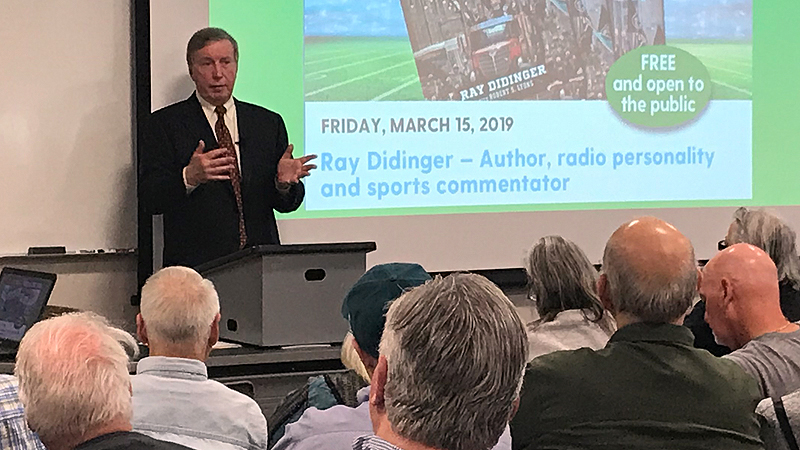
Although the calendar said it was March, and the warm weather served as a welcome reminder that spring was on the way, it felt and looked more like Super Bowl Sunday at the University of Delaware’s Arsht Hall in Wilmington for the opening session of the semester’s Osher Lifelong Learning Institute (OLLI) Friday Lecture Series.
There was no talk of the excitement and optimism about the Phillies and their signing of free agent superstar Bryce Harper. Nobody was discussing how the Sixers were preparing for a playoff run and rewarding those who were willing to trust the process. There was not any interest in the March Madness field of 68 that was sure to include defending national champion Villanova.
With many of the 150 or so enthusiastic sports fans in attendance outfitted in Eagles gear, including the jerseys of Carson Wentz, Nick Foles, Brian Dawkins and Brian Westbrook among others, Pro Football Hall of Fame sportswriter Ray Didinger presented “The NFL at 100: How Football Became America’s Game” and explained why football is always in season. The author of 11 books, most recently The Eagles Encyclopedia: Champions Edition, took the audience on a journey from the game’s humble beginnings, when the NFL was founded as the American Professional Football Association in 1920, to its stronghold as the country’s most popular sport.
Didinger said the NFL generated more than $8 billion in revenue in 2018, and he pleased the crowd by reporting that the Eagles are worth in excess of $2 billion. However, he also prompted some good-natured booing when he broke the news that the rival Cowboys head the list of the most valuable sports franchises in the world at $4.8 billion.
“Don’t blame me; don’t blame me; don’t shoot the messenger,” joked Didinger, who is also well-known for his broadcasting work on SportsRadio 94.1WIP and NBC Sports Philadelphia.
Sixty-seven percent of Americans identify themselves as pro football fans, and games are televised in 225 countries and broadcast in 32 languages. With sales of NFL-licensed merchandise exceeding $3 billion per year, NFL Properties is the fourth-largest brand in the world.
“While Bryce Harper jerseys are hot, the NFL is actually hotter,” said Didinger.
Didinger said it was not always this way and that in the 1930s baseball was by far the country’s most popular sport, followed by college football, horse racing and boxing. In the 1940s, the University of Pennsylvania football team regularly outdrew the Eagles, and the Cleveland Browns paid a local radio station to carry their games.
“There was no network TV, merchandising or marketing back then,” said Didinger. “Game stories ran under one-column headlines buried deep in the sports section. Teams were losing money, and franchises were going out of business. From year to year, it was literally a struggle to survive.”

Didinger outlined his reasons for the NFL’s exponential growth, several of which he traced to the Philadelphia region. Along with Bert Bell making his mark as the first owner of the Eagles in 1933, as well as the team’s second head coach three years later, he had an even greater impact in his role as the league’s commissioner, conducting much of the business from his kitchen in Bala Cynwyd, Pennsylvania, from 1946 to 1959. Didinger credits Bell with creating the player draft, negotiating a merger with the All-America Football Conference, negotiating the first network TV contract, supporting the formation of the players association, creating the concept of sudden-death overtime, and negotiating and creating the concept of revenue sharing.
“The key to everything, really, was television,” said Didinger. “Television really defined America in the 1950s. In 1950, only 8 percent of American homes had a television. By the end of the decade, that number had risen to 87 percent. The biggest growth industry in this country in the 1950s was television by far. Families started eating dinner together in front of the television. Walt Disney, Davy Crockett and Ed Sullivan were in every living room. Television was the perfect vehicle for football. All Bert Bell had to do was bring them together, which he did. People watched and interest grew.”
With the growth of television came a calling to present the game from different perspectives to its viewers, especially behind the scenes. Though Didinger admits to being biased because of his 13 years as an Emmy Award-winning writer and producer for NFL Films, he feels the birth of the Laurel, New Jersey, company in 1962 played a vital role in the rise of the league’s status. Shortly after NFL Films was established, a Harris Poll showed that professional football had passed baseball in fan popularity for the first time. Didinger does not think it was a coincidence.
“Their [NFL Films’] artistry is what finally pushed pro football past baseball to a place atop the American sports scene,” said Didinger. “The NFL always had a history, but NFL Films gave it a mythology. They transformed every Sunday game into a ballet performed in the snow and the mud by 300-pound men in helmets and pads. NFL Films glorified and amplified the game. It took the average fan inside the game and inside the hearts of the men who played it and coached it. Its microphones allowed the fans to hear the hits and eavesdrop on the strategy.”
Despite his infectious and obvious love for the game, Didinger admits the NFL has its issues. He thinks Roger Goodell has largely been a weak and ineffective commissioner, the concern about concussions is real, and the officiating desperately needs to get better. Speaking about a critical pass interference call not made against the Rams late in this year’s NFC championship game, Didinger said he probably would have fired the whole crew if he were the commissioner.
“People in the league office have to accept that the officiating is so bad now that there are always at least one or two games every week that are decided by a blown call,” said Didinger. “It happens every week.”
Didinger also fielded questions from the fans who were especially interested in hearing his views on the future of the Eagles. He predicts a strong bounce-back season and is confident quarterback Wentz will have a big year. Assessing the other teams in the NFC East, he said the Giants are sort of stumbling all over themselves; the Redskins do not have a quarterback; and the Cowboys, last year’s division winners, are not terrific.
“I think it is sitting right there for the Eagles next year to come back and re-establish themselves as the best team in the division,” said Didinger.
Whether one is rooting for the Eagles or any of the other 31 teams in the NFL, Didinger cited several reasons to feel good about the game going forward. He said young stars like Patrick Mahomes, Saquon Barkley and Baker Mayfield brought new excitement to the league, while veteran players, such as Tom Brady, Drew Brees and Philip Rivers, continue to play at a very high level. While the offensive explosion throughout the league has provided a highly entertaining product, Didinger believes that is only part of the explanation for the game’s enormous appeal.
“I think the reason pro football has endured this long, survived the Great Depression, two world wars and countless other crises, and it stands now in the 100th year as America’s Game—capital A, capital G—can’t be found in just statistics and it can’t be defined solely by economics,” said Didinger. “To me it is really the game itself, what it is about, and what it says about us. It’s communal in a way that other sports are not. It’s an event that starts with the tailgate party in the parking lot three hours before kickoff, and then it moves into the stadium where the fans, season-ticket holders who have sat next to each other for years, they exchange greetings, they exchange hugs, and then they settle in to watch the game. Whatever the outcome, win or lose, it’s shared.”
Additionally, he thinks what we admire most about football is the teamwork and called it the ultimate team sport.
“Nothing is accomplished on a football field by a single individual,” said Didinger. “Even the placekicker needs someone to snap the ball and someone to hold it. All 11 men have to work together or else they won’t succeed. That is what we have to do in our own lives, and as society becomes more divided, working together becomes more challenging. Football reminds us that it can still be done.”
Sponsored by UD’s Osher Lifelong Learning Institute in Wilmington, the Friday Lecture Series is free and open to the public for adults of all ages. OLLI Wilmington is a membership organization for adults 50 and over to exchange ideas, take classes, teach and travel in the company of their peers. For more information, call 302-573-4417 or email LLL-wilm@udel.edu.